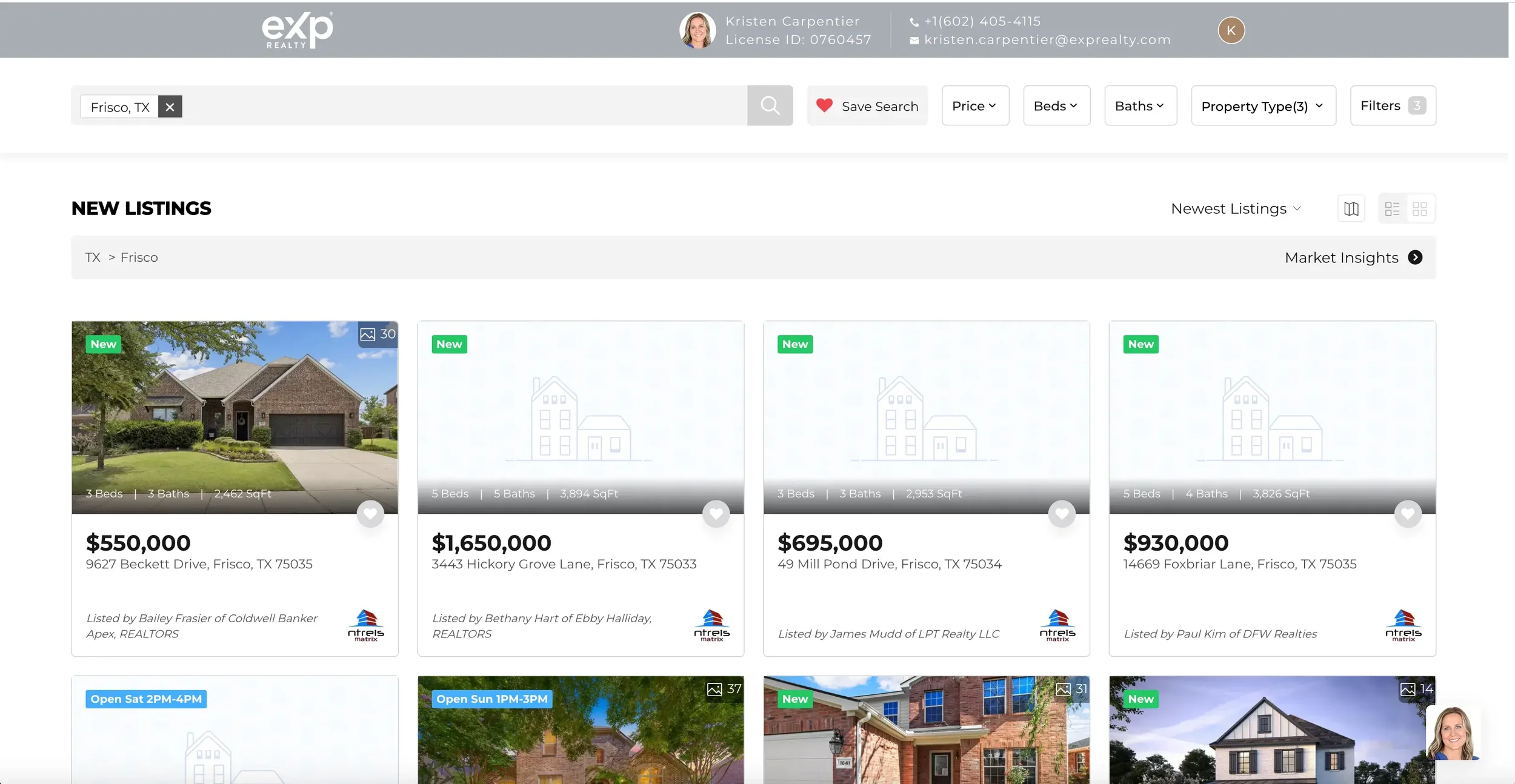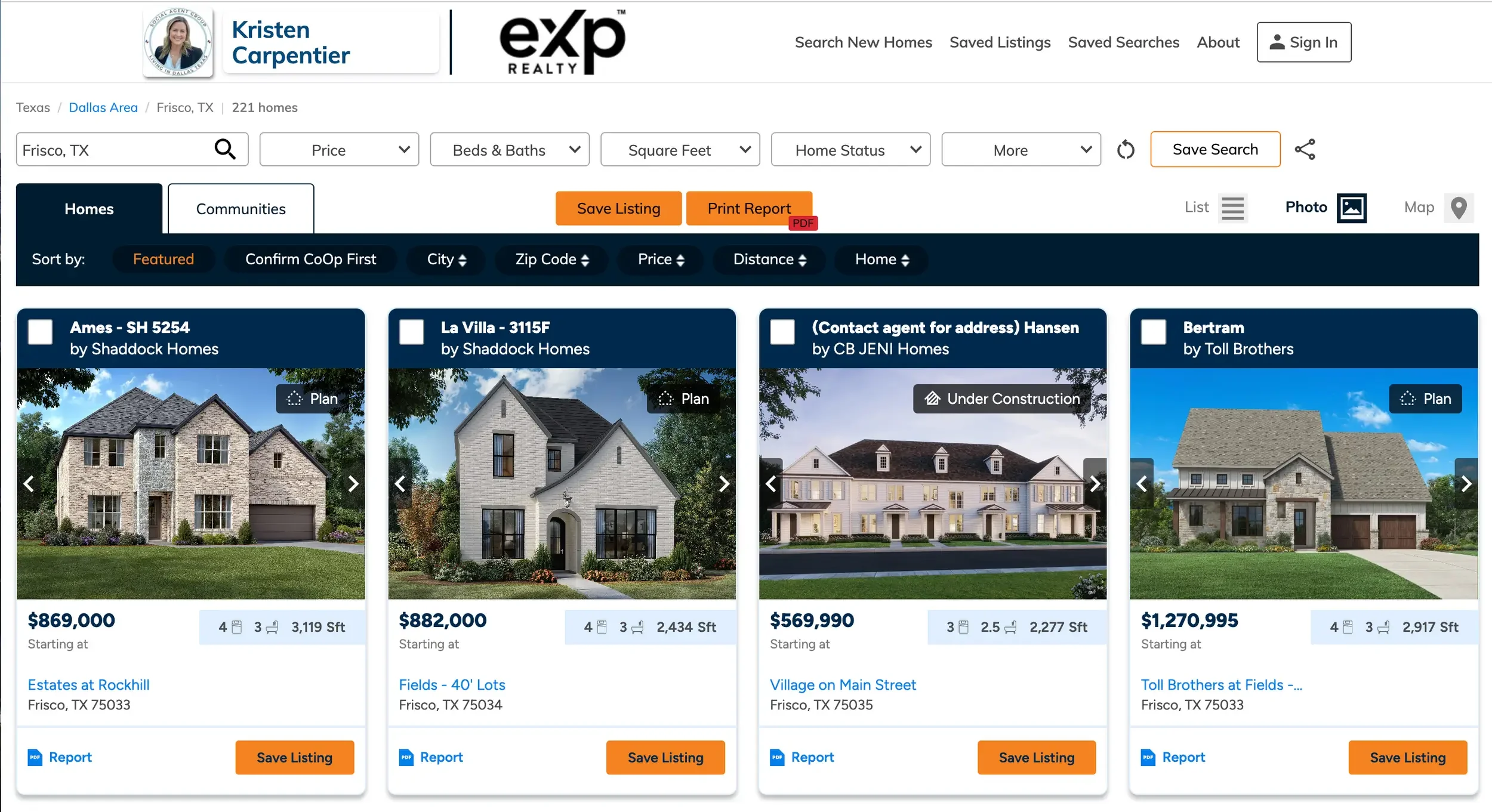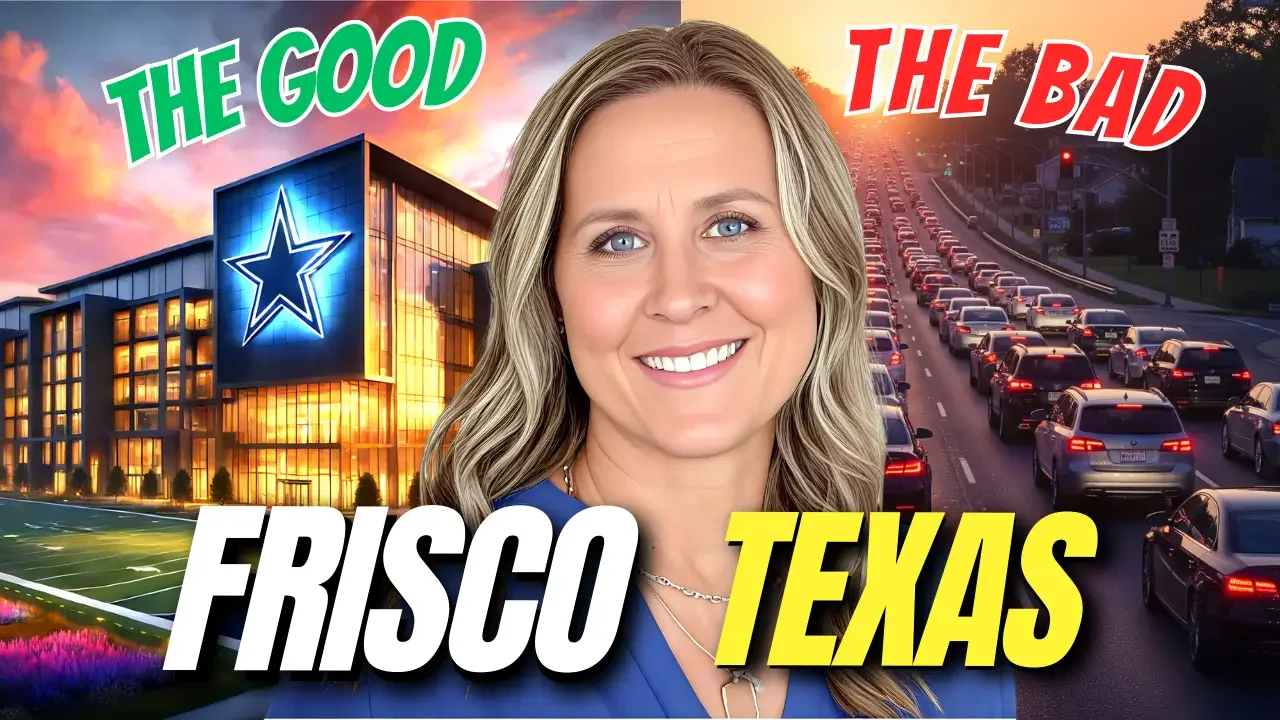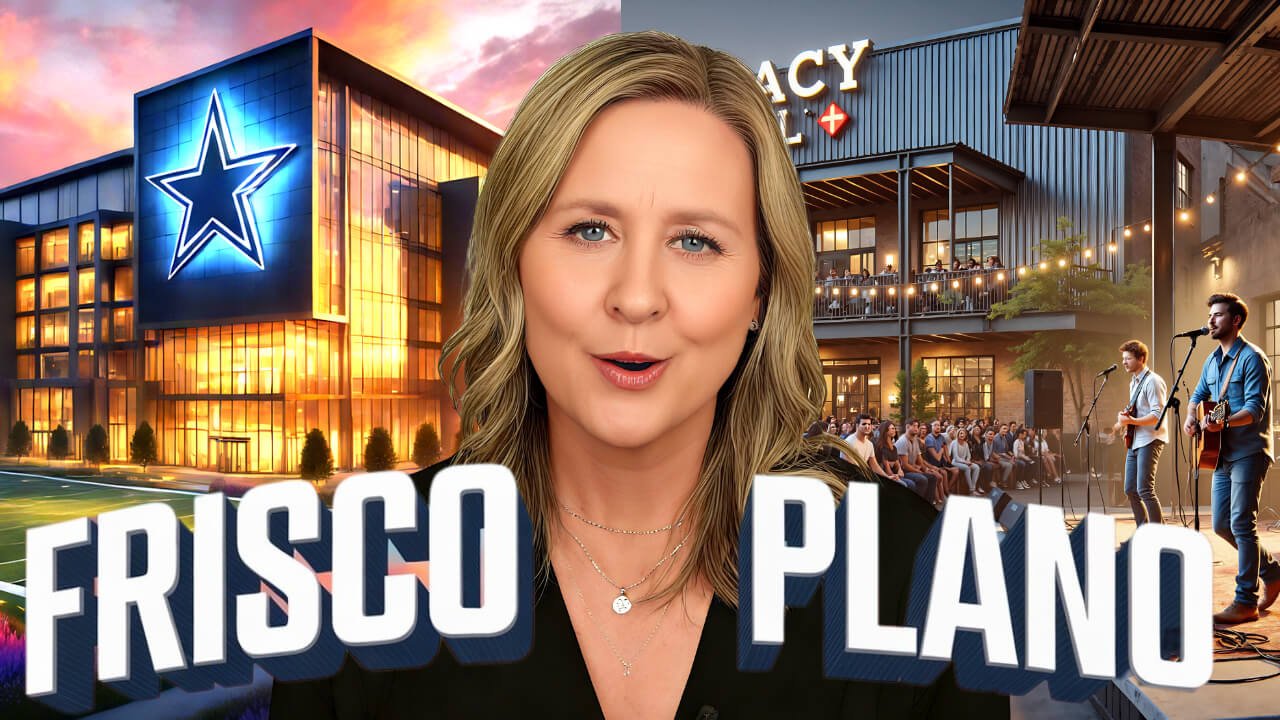
Why Move to Frisco, TX?
Explore top schools, master-planned neighborhoods, and unbeatable family amenities.
Frisco Texas Tour | Relocating to Frisco? Watch This First!
Take a complete tour of Frisco, Texas, one of the fastest-growing and most desirable suburbs in the Dallas-Fort Worth Metroplex. In this video, we explore Frisco’s top-rated schools, thriving business hubs, upscale shopping and dining, world-class sports venues, and beautiful master-planned communities. Learn about popular neighborhoods, local amenities, and why families and professionals alike are choosing Frisco as their new home. If you’re planning a move to North Texas, this guide will give you an insider’s perspective on what life in Frisco is really like.
Where is Frisco, Texas?
Frisco, Texas is one of the most popular Dallas suburbs located approximately 30 miles north of Downtown Dallas and about 25 miles northeast of Fort Worth, in the rapidly growing North Dallas suburbs. It spans both Collin County and Denton County, offering residents quick access to major highways like the Dallas North Tollway, Sam Rayburn Tollway (SH-121), and US-380. Frisco borders Plano, McKinney, The Colony, and Prosper, positioning it as a strategic hub for commuting, business, and leisure. The city is home to popular destinations such as The Star (Dallas Cowboys World Headquarters), Stonebriar Centre, and the Frisco RoughRiders Ballpark, while also being just a short drive from Legacy West, Grandscape, and DFW International Airport. With its mix of suburban comfort, urban conveniences, and top-rated schools, Frisco continues to be one of the fastest-growing cities in the Dallas-Fort Worth Metroplex.
Frisco, Texas by the Numbers
Thinking about moving to Frisco? Here are the key stats families and professionals want to know.
Sources: U.S. Census Bureau, MLS, Niche.com, WalletHub
Pros and Cons of Living in Frisco, Texas
Key Advantages
- A+ Public Schools (Frisco ISD) – FISD holds an A+ rating and operates a large, well-resourced system with dozens of campuses across elementary, middle, and high school levels.
- Multiple Smaller High Schools – With many high school campuses, students benefit from more opportunities to participate in academics, arts, and athletics without the feel of mega-campuses.
- Advanced Academics Pipeline – FISD automatically places high-performing 5th graders into advanced math in 6th grade and offers robust acceleration and college-prep options districtwide.
- “Sports City” Amenities – World-class venues like The Star (Dallas Cowboys HQ), Toyota Stadium (FC Dallas), Riders Field (RoughRiders), and the PGA Frisco/Omni resort create unmatched access to youth programs, camps, and events.
- Golf & Outdoor Recreation – Two championship courses, a lighted short course, and a massive putting green at the PGA Frisco campus, plus extensive city parks and trail networks.
- Family Attractions on the Way – The approved Universal Kids Resort project adds another family-friendly destination within city limits (scheduled opening currently targeted for 2026).
- Strategic Job Access – Direct connectivity to the Dallas North Tollway and SH-121 places residents near major employment hubs and corporate campuses across Frisco, Plano/Legacy West, and the 121 corridor.
Potential Drawbacks
- Higher Home Prices – Frisco’s desirability pushes median sale prices above many DFW suburbs; buyers should budget accordingly.
- Property Tax Burden – Total bills reflect city, county, college, and ISD rates; understanding all taxing entities is key for accurate cost-of-ownership.
- Toll Road Dependence & Costs – Frequent use of the Dallas North Tollway and SH-121 adds recurring expense; NTTA rates are on a biennial increase schedule.
- Traffic & Construction – Ongoing DNT widening and rapid growth bring periodic closures, detours, and congestion during peak hours.
- School Rezoning Happens – FISD reviews growth each year and adjusts attendance boundaries; families should verify zones annually before buying or leasing.
- Limited Fixed-Route Transit – Frisco isn’t a DART member; options are largely car-based with limited demand-response service for eligible riders.
Sources: Frisco ISD, Niche, Redfin, City of Frisco, NTTA, The Star/Toyota Stadium/Riders Field, PGA Frisco/Omni, and local news coverage.
Why So Many Families Are Moving to Frisco, Texas
Frisco is one of the fastest-growing cities in the U.S., drawing families, professionals, and retirees alike. With A+ rated schools, expansive parks, luxury shopping, and a vibrant job market, it’s no wonder Frisco tops the list for relocation.
Whether you're moving from across the country or across the metroplex, I help families find the perfect home in Frisco every day — and I can help you too.
📞 Let’s Talk About Moving to FriscoWhat It’s Really Like Living in Frisco, Texas
Frisco, Texas has become one of the fastest-growing cities in the United States—and it’s easy to see why families keep putting it at the top of their relocation list. This North Dallas suburb blends modern conveniences with a true community spirit, offering a place where kids can safely bike to the park, neighbors still wave hello, and everything you need—from groceries to great schools—is just minutes away.
For families, the appeal starts with Frisco ISD’s top-rated public schools, designed with smaller high school enrollments so every student has the chance to participate in academics, athletics, and the arts. Master-planned neighborhoods are built with families in mind, featuring splash pads, playgrounds, walking trails, and community pools. Many developments also organize seasonal events, movie nights, and block parties, making it easy to meet people and feel at home quickly.
Frisco also delivers when it comes to entertainment and amenities. The city is home to The Star—the Dallas Cowboys’ world headquarters—along with Toyota Stadium for FC Dallas soccer, Riders Field for minor league baseball, and the PGA Frisco golf campus. Families can spend weekends at the Frisco Discovery Center, shop at Stonebriar Centre or Legacy West in Plano, or enjoy one of the city’s many local restaurants and coffee shops. Parks and green spaces are everywhere, and the city’s trail network makes it easy to stay active.
Location is another advantage. With direct access to the Dallas North Tollway and SH-121, commuting to major employment hubs in Plano and Dallas is simple. Frisco also sits near major corporate headquarters, tech companies, and healthcare facilities, creating strong job opportunities right in town. Nearby cities like McKinney and The Colony offer even more dining, entertainment, and recreational options just minutes away.
Of course, Frisco isn’t without trade-offs. It’s a high-growth city, which means new construction, evolving traffic patterns, and a faster pace of life. Public transportation options are limited, so a car is essential, and home prices reflect the city’s popularity. For those who prefer historic charm or a slower pace, suburbs like Fairview may feel like a better fit—learn more about Fairview, Texas.
Still, for many families, that energy and growth are part of Frisco’s charm. It’s a place where you can buy a brand-new home, enroll your kids in excellent schools, enjoy resort-style community amenities, and have access to pro sports, dining, shopping, and outdoor recreation—all within your own city limits. Frisco’s mix of opportunity, safety, and family-friendly planning has made it one of the most sought-after places to live in Texas, and for good reason.
Whether you’re moving for schools, safety, career opportunities, or lifestyle, Frisco offers the perfect balance of suburban comfort and modern excitement. It’s not just a place to live—it’s a place to thrive.
🔒 Crime & Safety in Frisco, TX
Frisco earns a solid B on Niche, with both violent and property crime rates well below national averages. NeighborhoodScout reports ~197 violent crimes (0.88 per 1,000) and ~3,108 property crimes (13.81 per 1,000), ranking Frisco safer than ~70% of U.S. cities (Crime Index 30/100). Combined, Frisco stands out as one of the safest mid‑sized U.S. cities—bolstered by strong community policing, neighborhood surveys, and city planning initiatives (Niche.com, Niche Crime Stats, NeighborhoodScout).
Niche.com – Crime & Safety Grade: B
Violent Crime vs U.S. Average: Assault: 71.7 (US: 282.7) | Murder: 0 (US: 6.1) | Rape: 19.6 (US: 40.7) | Robbery: 11.4 (US: 135.5)
Property Crime vs U.S. Average: Burglary: 95.9 (US: 500.1) | Theft: 1,183.8 (US: 2,042.8) | Motor Vehicle Theft: 57.5 (US: 284)
Frisco’s B rating reflects very low violent and property crime compared to national figures, strong police presence, and high community safety feedback scores. Source
NeighborhoodScout – Crime Data
Total Crime Index: 30 (Scale: 100 = Safest)
Annual Crime Totals: Violent: ~197; Property: ~3,108; Total: ~3,305. Source
Rates per 1,000 residents: Violent: 0.88 (TX Avg: 4.06 | U.S.: ~4); Property: 13.81 (TX: 22.38 | U.S.: ~19). Source
Chance of victimization: Frisco: 1 in 1,142 (violent); 1 in 72 (property). Texas: 1 in 246 (violent); 1 in 45 (property). Source
🔎 Helpful Crime & Safety Resources
Frisco, Texas School District Ratings & Insights
Frisco Independent School District (FISD) serves more than 65,000 students across the north Dallas suburbs with a
“smaller high-school” model that helps keep academics, arts, and athletics accessible. On Niche.com, Frisco ISD holds an
overall grade of A+ for 2025, with consistently strong marks in academics and college prep. Families appreciate the breadth of
programming (AP/dual credit, fine arts, CTE) and the district’s clear feeder patterns and zoning tools for newcomers.
(Sources: Niche – Frisco ISD Profile,
FISD Facts & Figures,
GreatSchools – District)
Frisco ISD Quick Facts (2024–25)
Students: ~65,000+ (PK–12)
Campuses: ~77 total (approx. 43 elementary, 18 middle, 12 high schools, plus specialty centers)
Model: Smaller high schools to expand participation in courses, activities, and athletics
College Prep: Strong AP & dual-credit participation; TEA “A” college-readiness indicators
New to the Area? Verify your address with the Attendance Zone Search and Feeder Pattern Maps
Top Schools in Frisco ISD
Reedy High School (Grades 9–12)
GreatSchools: 9/10
Highly rated academics and college readiness; wide AP selection and competitive athletics. Learn more
Lebanon Trail High School (Grades 9–12)
GreatSchools: 8/10
Strong AP participation and student support; serves southeast Frisco/Legacy corridor. Learn more
Fowler Middle School (Grades 6–8)
GreatSchools: 9/10
Known for rigorous academics, fine arts, and a supportive campus culture. Learn more
Ratings change year to year—use the links above to verify current scores and programs for your target address.
Frisco ISD – Overall Niche Grade: A+
Source: Niche – Frisco ISD (2025)
🏘️ Best Family-Friendly Neighborhoods in Frisco
Starwood
Gated luxury living near The Star, with mature trees, private parks, and top-rated Frisco ISD schools.
View HomesPhillips Creek Ranch
Master-planned community with lakes, trails, clubhouse, pool, and playgrounds — zoned to top schools.
View HomesNewman Village
Upscale gated neighborhood with European-inspired design, community events, and private amenities.
View HomesShaddock Creek & Park Place Estates
Established homes on larger lots, parks, trails, and proximity to great schools and Frisco Square.
View HomesThe Fields
New luxury master-planned development featuring PGA headquarters, green spaces, and future retail.
View HomesLone Star Ranch
Resort-style master-planned community with trails, pools, a lazy river, and top-rated Frisco ISD schools—ideal for active families.
View HomesSearch All Homes for Sale in Frisco, TX
Explore the latest real estate listings in Frisco — including new builds, resale homes, luxury properties, and family-friendly neighborhoods. This live feed is updated daily directly from the MLS.
 🔍 View All Frisco Listings
🔍 View All Frisco Listings
New Construction Homes in Frisco
Discover the latest new build homes in Frisco, Texas. Explore builder communities, incentives, quick move-ins, and more.

Frisco Real Estate Market Trends
These live market charts show the latest real estate trends in Frisco, TX — including median home prices, number of closed sales, days on market, inventory levels, supply of homes, and how close sellers are getting to their original asking price. Updated monthly from NTREIS MLS, this data provides valuable insight into how the Frisco housing market is performing and whether it’s currently a buyer’s or seller’s market.
More Articles About Living in Frisco
Discover helpful blog content about moving to Frisco, Texas — including suburb comparisons, local neighborhood insights, homebuyer tips, and relocation advice. New posts are added regularly to support your journey.
Frisco, Texas — Frequently Asked Questions
Is Frisco one of the fastest-growing suburbs in the U.S.?
Yes. Frisco has consistently ranked among the fastest-growing cities in America, with a population increase of nearly 30% over the past decade. This rapid growth is fueled by job opportunities, top-rated schools, and major developments like The Fields, Hall Park, and PGA Frisco.
How does the cost of living in Frisco compare to other DFW suburbs?
Frisco’s cost of living is higher than many Dallas suburbs, mainly due to housing costs. Median home prices exceed $700,000, and property taxes average 2.0–2.2% of assessed value. Nearby cities like McKinney, Allen, and Prosper may offer lower housing costs while maintaining similar amenities.
What are the best neighborhoods in Frisco for families?
Neighborhoods like Newman Village, The Trails, Panther Creek, Stonebriar, and the Fields West development are popular for families. These areas feature top-rated schools, parks, trails, and family-focused community events.
Is Frisco a diverse and inclusive community?
Yes. Frisco is one of the most diverse suburbs in North Texas, with over 60 languages spoken in Frisco ISD schools. The city actively promotes cultural events, festivals, and inclusion initiatives, attracting residents from across the U.S. and internationally.
How good are Frisco schools, especially for academics and athletics?
Frisco ISD is a top-rated district in Texas, known for strong academics, STEM programs, and small student-to-teacher ratios. Athletics are highly competitive, with state-ranked teams and premier facilities like The Star and Ford Center.
What is traffic like in and around Frisco?
Traffic has increased significantly with growth, especially on Dallas North Tollway and Highway 380. Commutes to Dallas typically range 35–60 minutes. Planned road expansions, the US-380 bypass, and public transit discussions aim to ease congestion in coming years.
Are there affordable housing options, such as apartments or townhomes?
While Frisco’s single-family homes are pricey, the city has luxury apartments, townhomes, and build-to-rent homes. Average rent for a 2–3 bedroom unit is $2,000–$2,600/month, with some smaller apartments below $2,000 depending on location.
What safety concerns should I know about in Frisco?
Frisco ranks among the safest cities in Texas and the U.S., with violent crime rates under 1 per 1,000 residents. Property crime exists but is lower than state and national averages. The city’s police department is active in community policing and neighborhood watch programs.
How has Frisco’s rapid growth affected infrastructure and amenities?
Population growth has led to more construction, road congestion, and school rezoning. However, Frisco continues to add new schools, parks, entertainment districts, and medical centers to meet demand, making it one of the most self-sufficient suburbs in DFW.
What are the property tax implications of living in Frisco?
Frisco has no state income tax but higher property taxes, averaging 2.0–2.2% of home value. A $650,000 home can see $13,000–$15,000 annually in taxes. Some communities also have MUD or PID fees, increasing total costs.
What employment opportunities are available in Frisco and nearby?
Frisco has major employers like T-Mobile, PGA of America, and Baylor Medical Center. Its proximity to Plano and Dallas adds access to corporate headquarters like Toyota, JPMorgan Chase, Liberty Mutual, and other Fortune 500 companies.
What recreational and cultural amenities does Frisco offer?
Frisco boasts over 70 parks, 90+ miles of trails, The Star (Dallas Cowboys HQ), Toyota Stadium, shopping centers like Stonebriar Mall, the National Videogame Museum, and planned additions like Fields West for future dining and entertainment.
What future developments are planned in Frisco?
Large-scale projects include PGA Frisco, Fields West, Hall Park’s 2.0 expansion, new schools, hospitals, and tollway extensions, shaping Frisco’s next decade of growth with more jobs, housing, and entertainment options.
What are the pros and cons of living in Frisco compared to Plano or McKinney?
Pros: Newer homes, strong schools, lower crime, high-quality amenities. Cons: Higher housing costs, heavy traffic, and a fast-paced, sometimes “crowded” suburban feel compared to the more established vibe of Plano or McKinney.
Does Frisco have good public transportation options?
No direct light rail or DART service is available in Frisco. Most residents rely on personal vehicles or rideshare. Bus routes and DART expansions are being considered but not yet implemented.
How high are utility costs in Frisco, and can solar help offset them?
Summers are hot and utilities can exceed $300–$500/month in larger homes. Solar panels can help offset high energy costs, and Texas offers net metering options in some service areas.
What is the rental market like for newcomers planning to buy later?
Frisco has many luxury rental options near Legacy West, The Star, and Fields. Build-to-rent communities offer single-family homes for temporary stays before purchasing, though rental prices trend higher than nearby cities.
What is nightlife and entertainment like in Frisco?
Frisco has a growing nightlife with bars, live music, restaurants, and family-friendly entertainment. Legacy West, The Star, and Grandscape in nearby The Colony add upscale dining, comedy clubs, and late-night spots.
What healthcare facilities and hospitals are in Frisco?
Frisco has several top-rated hospitals including Baylor Scott & White Medical Center, Texas Health Frisco, and Children’s Medical Center Plano nearby, offering extensive specialty care and emergency services.
Does Frisco have unique HOA rules or city ordinances to know about?
Most master-planned communities have HOAs regulating landscaping, fencing, and exterior design. Frisco city ordinances cover noise limits, short-term rentals, and construction hours. Always review HOA bylaws before buying.
Are there any downsides to living in Frisco?
Downsides include high home prices, rising property taxes, increased traffic, and a more “crowded” feel compared to when it was a smaller town. Some residents say the rapid pace of development has impacted its original small-town charm.







Frisco vs McKinney vs Flower Mound: compare schools, commutes, housing costs, taxes (MUD/PID), lifestyle and resale—family-focused DFW relocation guide with new listings.